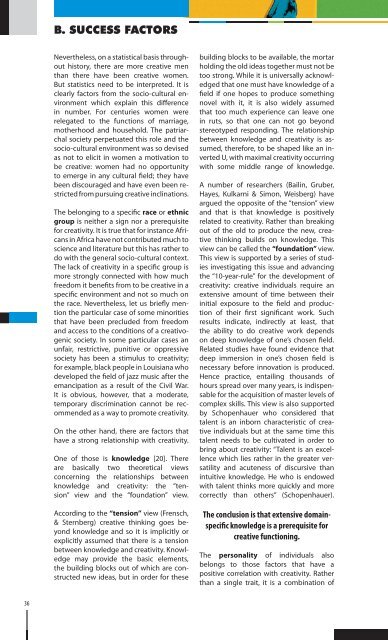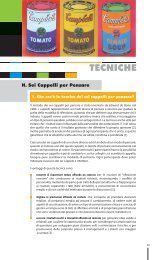Creativity Theory - TRaining MAterial in Creativity and InnovaTion ...
Creativity Theory - TRaining MAterial in Creativity and InnovaTion ...
Creativity Theory - TRaining MAterial in Creativity and InnovaTion ...
You also want an ePaper? Increase the reach of your titles
YUMPU automatically turns print PDFs into web optimized ePapers that Google loves.
36<br />
B. SUCCESS FACTORS<br />
Nevertheless, on a statistical basis throughout<br />
history, there are more creative men<br />
than there have been creative women.<br />
But statistics need to be <strong>in</strong>terpreted. It is<br />
clearly factors from the socio-cultural environment<br />
which expla<strong>in</strong> this difference<br />
<strong>in</strong> number. For centuries women were<br />
relegated to the functions of marriage,<br />
motherhood <strong>and</strong> household. The patriarchal<br />
society perpetuated this role <strong>and</strong> the<br />
socio-cultural environment was so devised<br />
as not to elicit <strong>in</strong> women a motivation to<br />
be creative: women had no opportunity<br />
to emerge <strong>in</strong> any cultural field; they have<br />
been discouraged <strong>and</strong> have even been restricted<br />
from pursu<strong>in</strong>g creative <strong>in</strong>cl<strong>in</strong>ations.<br />
The belong<strong>in</strong>g to a specific race or ethnic<br />
group is neither a sign nor a prerequisite<br />
for creativity. It is true that for <strong>in</strong>stance Africans<br />
<strong>in</strong> Africa have not contributed much to<br />
science <strong>and</strong> literature but this has rather to<br />
do with the general socio-cultural context.<br />
The lack of creativity <strong>in</strong> a specific group is<br />
more strongly connected with how much<br />
freedom it benefits from to be creative <strong>in</strong> a<br />
specific environment <strong>and</strong> not so much on<br />
the race. Nevertheless, let us briefly mention<br />
the particular case of some m<strong>in</strong>orities<br />
that have been precluded from freedom<br />
<strong>and</strong> access to the conditions of a creativogenic<br />
society. In some particular cases an<br />
unfair, restrictive, punitive or oppressive<br />
society has been a stimulus to creativity;<br />
for example, black people <strong>in</strong> Louisiana who<br />
developed the field of jazz music after the<br />
emancipation as a result of the Civil War.<br />
It is obvious, however, that a moderate,<br />
temporary discrim<strong>in</strong>ation cannot be recommended<br />
as a way to promote creativity.<br />
On the other h<strong>and</strong>, there are factors that<br />
have a strong relationship with creativity.<br />
One of those is knowledge [20]. There<br />
are basically two theoretical views<br />
concern<strong>in</strong>g the relationships between<br />
knowledge <strong>and</strong> creativity: the “tension”<br />
view <strong>and</strong> the “foundation” view.<br />
Accord<strong>in</strong>g to the “tension” view (Frensch,<br />
& Sternberg) creative th<strong>in</strong>k<strong>in</strong>g goes beyond<br />
knowledge <strong>and</strong> so it is implicitly or<br />
explicitly assumed that there is a tension<br />
between knowledge <strong>and</strong> creativity. Knowledge<br />
may provide the basic elements,<br />
the build<strong>in</strong>g blocks out of which are constructed<br />
new ideas, but <strong>in</strong> order for these<br />
build<strong>in</strong>g blocks to be available, the mortar<br />
hold<strong>in</strong>g the old ideas together must not be<br />
too strong. While it is universally acknowledged<br />
that one must have knowledge of a<br />
field if one hopes to produce someth<strong>in</strong>g<br />
novel with it, it is also widely assumed<br />
that too much experience can leave one<br />
<strong>in</strong> ruts, so that one can not go beyond<br />
stereotyped respond<strong>in</strong>g. The relationship<br />
between knowledge <strong>and</strong> creativity is assumed,<br />
therefore, to be shaped like an <strong>in</strong>verted<br />
U, with maximal creativity occurr<strong>in</strong>g<br />
with some middle range of knowledge.<br />
A number of researchers (Bail<strong>in</strong>, Gruber,<br />
Hayes, Kulkarni & Simon, Weisberg) have<br />
argued the opposite of the “tension” view<br />
<strong>and</strong> that is that knowledge is positively<br />
related to creativity. Rather than break<strong>in</strong>g<br />
out of the old to produce the new, creative<br />
th<strong>in</strong>k<strong>in</strong>g builds on knowledge. This<br />
view can be called the “foundation” view.<br />
This view is supported by a series of studies<br />
<strong>in</strong>vestigat<strong>in</strong>g this issue <strong>and</strong> advanc<strong>in</strong>g<br />
the “10-year-rule” for the development of<br />
creativity: creative <strong>in</strong>dividuals require an<br />
extensive amount of time between their<br />
<strong>in</strong>itial exposure to the field <strong>and</strong> production<br />
of their first significant work. Such<br />
results <strong>in</strong>dicate, <strong>in</strong>directly at least, that<br />
the ability to do creative work depends<br />
on deep knowledge of one’s chosen field.<br />
Related studies have found evidence that<br />
deep immersion <strong>in</strong> one’s chosen field is<br />
necessary before <strong>in</strong>novation is produced.<br />
Hence practice, entail<strong>in</strong>g thous<strong>and</strong>s of<br />
hours spread over many years, is <strong>in</strong>dispensable<br />
for the acquisition of master levels of<br />
complex skills. This view is also supported<br />
by Schopenhauer who considered that<br />
talent is an <strong>in</strong>born characteristic of creative<br />
<strong>in</strong>dividuals but at the same time this<br />
talent needs to be cultivated <strong>in</strong> order to<br />
br<strong>in</strong>g about creativity: “Talent is an excellence<br />
which lies rather <strong>in</strong> the greater versatility<br />
<strong>and</strong> acuteness of discursive than<br />
<strong>in</strong>tuitive knowledge. He who is endowed<br />
with talent th<strong>in</strong>ks more quickly <strong>and</strong> more<br />
correctly than others” (Schopenhauer).<br />
The conclusion is that extensive doma<strong>in</strong>specific<br />
knowledge is a prerequisite for<br />
creative function<strong>in</strong>g.<br />
The personality of <strong>in</strong>dividuals also<br />
belongs to those factors that have a<br />
positive correlation with creativity. Rather<br />
than a s<strong>in</strong>gle trait, it is a comb<strong>in</strong>ation of



